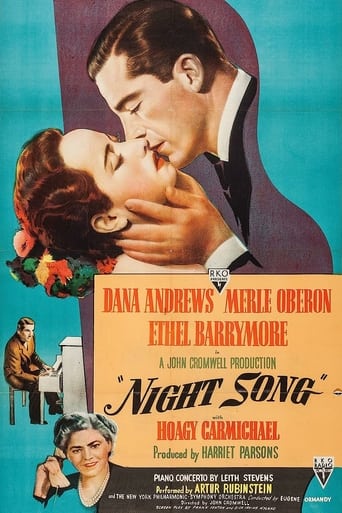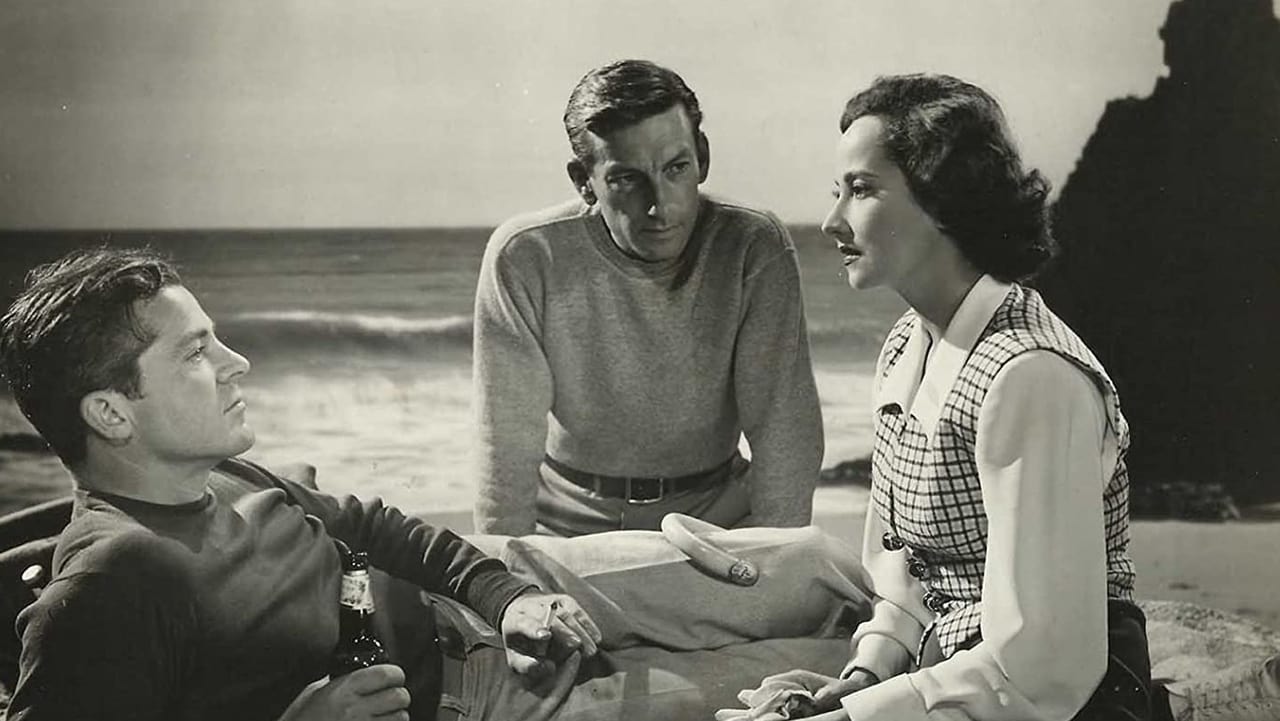writers_reign
In a brief triumph of hope over knowledge I entertained fleetingly the notion that this just might be a movie version of Cliff Odets' Night Music, his 1940 play whose failure in 1940 led to the demise of the charismatic Group Theatre out of which emerged so many lustrous talents both behind - Odets himself, Harold Clurman, Lee Strasberg, Elia Kazan - and in front of the camera - Kazan again, Lee J. Cobb, Franchot Tone, John Garfield. In the event, of course, Night Song is a totally different affair improbably cast and with more holes than a Swiss cheese - for example Hoagy Carmichael leads a 'swing' band with a residency in a night club in San Francisco in which Dana Andrews is the blind pianist; we never hear the band playing anything remotely resembling swing and after the first reel we never see the band or the club again concentrating instead on the unlikely quartet comprising the two men plus Merle Oberon and Ethel Barrymore. Having fallen for Andrews on sight (sorry about that) whilst 'slumming', society dame Oberon affects blindness of her own to win Andrews love. His condition can, of course, be cured in a heartbeat but it will take major bucks and a surgeon in New York. He thinks that Oberon hasn't got change of a match and wouldn't take her money even if he knew she was really Miss Gotrocks but love of course will find a way. Oberon 'creates' a music competition with five K (this is 1947) for the best classical competition and arranges for Andrews to win it. Do I really need to go on? If you can get past this hoke and more - and yes, there IS more, I kid you not, then chances are you'll enjoy it.
bobvend
This film predates my birth by ten years, but after just seeing it on TCM, I had to weigh in. Overlong? ...well probably, and certainly contrived, given the plot. But somehow, it works, and does so beautifully.Both Andrews and Oberon do the best they can with their characters: he, a blind pianist playing in dives; she, a wealthy socialite who likes to go slumming. Enamoured by him, she feigns blindness in order to insinuate her way into his bitter existence. Both Hoagy Charmichael and stalwart Ethel Barrymore add comic bite and the requisite amount of wisdom as they lend their support to the ruse. And there are some cleaver twists which keep the game running just when one would think they would otherwise send it careening off the tracks. And it's hard for me to think of another film in which Merle Oberon was more beautiful.Set your reality check to its lowest setting and enjoy this classic sudser. And, if you're not a fan of classical music, this film just might change that!
simonson024
The job of a movie is to give the audience members a bigger slice of life than they would normally experience. Night Song, a classic movie of the post-war 1940's, gives that slice of life with rare grace, elegance and style. Critics have panned it because of the "bad" far-fetched plot, the "bad" music, and "bad" acting.I like this movie because, quite coincidentally, I personally have digested many of the slices of life in the "far-fetched" plot. The movie is about a piano player/composer who is struck on the head in the prime of his life. I am a piano player/composer who was struck on the head in the prime of my life. We both made it through a war era untouched, he WWII, and I Vietnam, well almost. He is living hand to mouth with his best friend. I am also living hand to mouth with my best friend, my wife. For those who love far-fetched coincidences: The composer's last name is Evans—my grandfather's name before he changed it. The movie was probably shot in 1946, the year I was born. Exactly 20 years later I saw Artur Rubenstein, who acted and performed in this movie, in a concert at the Music Center in Los Angeles--the only time I ever went to such a concert. It opened in Sweden on my birthday. What could be more far-fetched?. The not so far-fetched plot twists were not lost on me. As I watched, I was saying to myself, "What is possible for me? Miracles happen every day! Every success story was improbable before it happened!" After watching the film, I went over to the piano and played my own unfinished concerto once again! As for the Leith Stevens music, if you didn't like it, say so. If it didn't touch you, say so. I liked it, immensely. It touched me immensely! If you want a thrill, type in Leith Stevens on IMDb. You'll find page after page of musical credits—right up to 2005! The man is a modern master composer played by the greatest performers of that time in this movie! Not bad for "bad" music! The job of film critics is to say what they like and dislike about films and why. They should leave all categorical good and bad thoughts completely out of the conversation.One measure of the talent of an actor, and some say the only measure of a film, is the ability to transport the mind and the spirit of the viewer to another time and place. I was completely transported by this movie. I was perfectly comfortable with ALL the performances, by some of the most distinguished actors of the era, because I was ready, willing and able to be transfixed; and this film is transfixing! Let's get it on DVD!
bmacv
Unabashedly sentimental and a little silly (and all the more winning for it), John Cromwell's Night Song is about love, music and blindness. After a night at the San Francisco Symphony, Merle Oberon goes slumming with her high-hat companions to a joint called Chez Mamie. Promptly she falls for the blind piano player, Dana Andrews, who hews to the unbreakable Hollywood code of the vital male with a disability: he takes it out on everybody around him, including her.With the help of his band-mate and companion Hoagy Carmichael, she comes up with the sort of plan that would better be left to Lucy Ricardo - she pretends to be blind, too! And not only blind but living on slender means, so of course the proud Andrews comes to reciprocate her love. Meanwhile, she uses her secret wealth to fund a composition prize, which goes to Andrews for the piano concerto he's been bitterly working on. He wins, and with the money flies to New York not only to have his sight restored but to hear his work played by Artur Rubinstein under Eugene Ormandy's baton (both appear as themselves; the concerto, alas, by Leith Stevens, dispels no memories of Brahms' 2nd).In New York, the newly sighted Andrews meets up with Oberon - not as the poor blind girl but as his society benefactress (he's never seen her, remember, but you'd think he'd remember her voice - he is, after all, a musician). He falls in love with her, too, or again, or something, but then starts to think that he's a heel for throwing over the woman he left in San Francisco....Night Song is one of those late-40s/early-50s movies that takes classical music seriously, and hurray for that. It also features that wise old crone Ethel Barrymore as Oberon's aunt, all knowing smirks and wry aphorisms (it's exactly the performance she gave in A Portrait of Jennie that same year). Best of all is Lucien Ballard's inspired photography: in the digs that Andrews and Carmichael share, he overlays a shadowy scrim from the tracery in the lace curtains and the gingerbread that festoons the archways. All in all, Night Song is a bittersweet romance of that potent post-war vintage; it's intoxicating, and puts your good judgement quite to sleep.



 AD
AD


